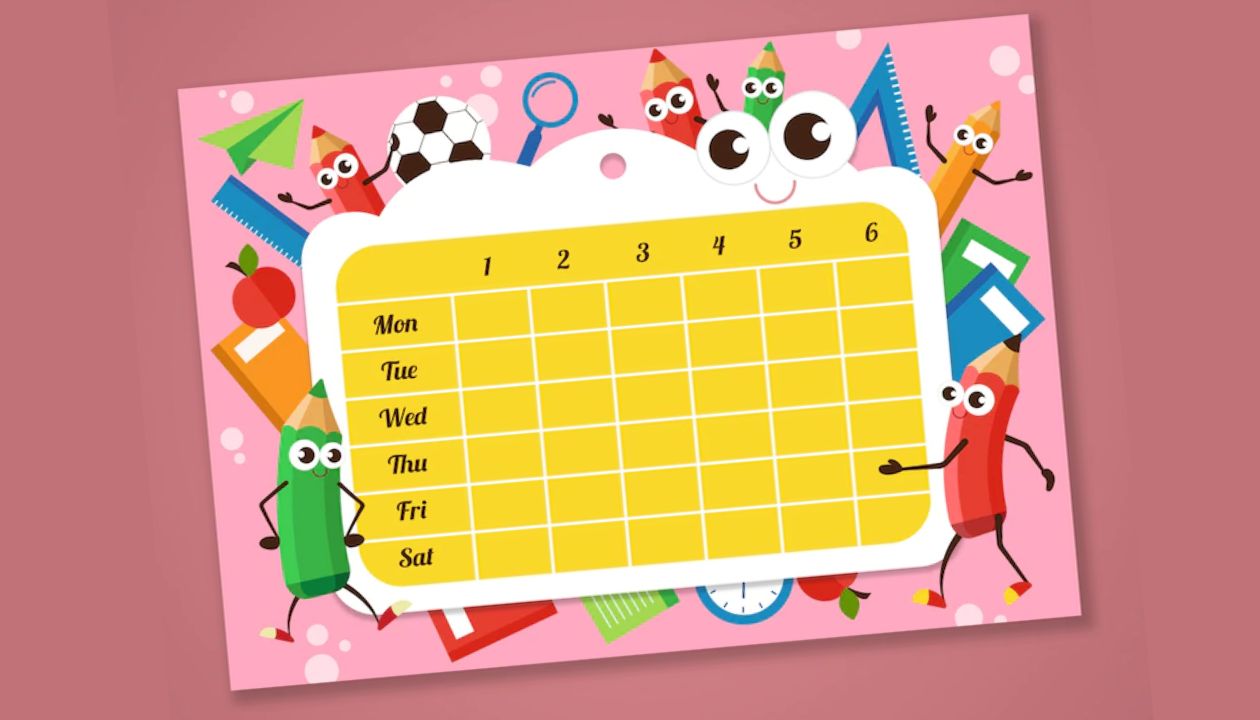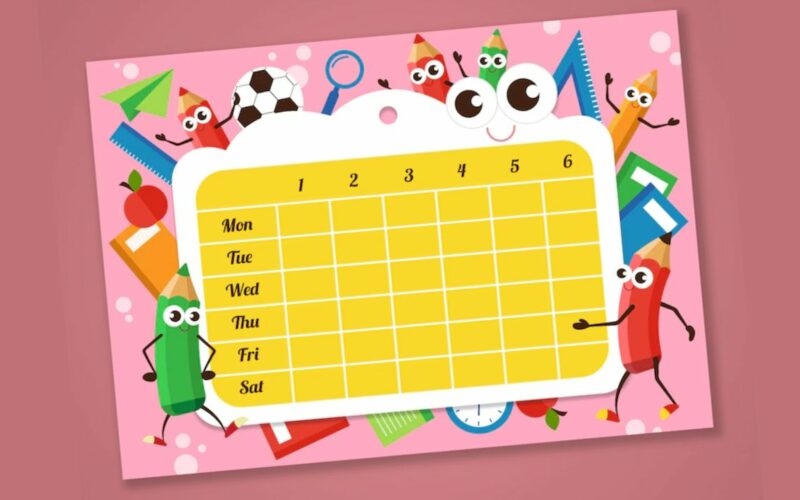A timetable is the alarm clock we set for ourselves. It helps us in keeping up with our tasks before the big day. After the hit of the pandemic, we experienced a new culture. It revolved around our phones, laptops, and televisions.
We adapted to a life of staying inside four walls. But how do we ensure that we study and learn with the same amount of focus?
A way to do this is by making a schedule that suits your needs and situation. If you want to achieve something, you at least need a plan. It's easier to get things done when you plan ahead of time. But, just any schedule won’t work. You need to carefully plan it, craft it and adapt to it.
Studying at home is different from our usual school or college routine. It demands a greater amount of focus and effort.
A good time table for study at home will set you up in a productive routine so you don’t waste your precious time. Keep reading so you can understand “How to make a time table for study at home”.

How to Make a Perfect Time Table for Students?
Here are the 11 best tips that will help you to craft a perfect timetable for studying at home for students.
1. Analyze Your Study Patterns

Before you craft a timetable for the study, you must check the way you study. To do this, you have to observe the pace, time, and situations that suit you the best.
How long can you study before you need a break? Do you need early mornings or late nights to study? Ask yourself many such questions.
Depending on your answers, you are going to schedule your breaks, decide on the sequence of subjects to study, the time you’ll dedicate to each subject, etc.
For example, If you feel sleepy after lunch, add the power nap time to your schedule. In case your best study hours are at 5.00 am, you can use it for a difficult subject. In such a manner you can make the best timetable for your daily routine.
2. Know How Much Time You’ve Got Every Day

Apart from studies, students have a lot of other commitments during the day. If you have classes or lectures, it will play a part in shaping your timetable.
Calculate the number of hours you have in your hand. This should be after deducting school or college hours, lunch, dinner, exercise, and time for other important activities.
The next step is to allot time. There are few subjects that demand regular practice, for example, Mathematics. Ensure that you allow an hour or so every day for it.
This will give you an idea of how many hours can be given to each subject within the available time. Consider the difficulty level, interest, revision, and practice needed by the course.
3. Have a Realistic View

On the days we’re motivated, there’s the excitement of doing anything and everything. This is good, but only when it is actually possible.
Set realistic goals for yourself. Make your study timetable with a long-term view. So, keeping this in mind, set an achievable goal and split this into a set of smaller goals.
Assume that you plan on completing 25 percent of your social science syllabus in two months. Now, plan on achieving it by completing one chapter and not seven in a day.
This is obviously just an example. Set these goals as per your pace and learning capacity. After all, what is realistic for you might be impossible for someone else.
Also read: Goal Setting Guide With Ways to Achieve Goal
4. You Need a Break

Breaks are the refresh option for your brain. When you constantly study for long hours your productivity decreases.
You need to treat yourself to a walk, a bar of chocolate, an interesting video, a few minutes of social media, talk with a friend, or any other way after every few hours.
This is because taking breaks is one of the best ways which help you to focus better. As you decide on your study schedule, don’t forget to add them. Take some long breaks and some short breaks.
There are times when you’ll just get up for 15 minutes but will end up wasting the entire day. Refresh your brain but don’t make it lazy. Always come back to your desk on time.
5. Review Time

At the end of the day spare around 15-20 minutes so you can reflect upon what you’ve learned. This review time is vital because you’ll know the mistakes you made while studying, gives you a quick recap, and lets you know what way you would have learned better.
Be the biggest critic of yourself and use these self-feedbacks to improve your learning pattern.
6. Your Brain Enjoys The Variety

I made the mistake of studying a single topic for the entire day. This may seem satisfying, but it doesn't really help you. When you study a single topic thoroughly and entirely before moving on to the next you’re using the “blocking method” to study.
Though it seems like you’ve mastered it, you’re likely to forget it soon. On the contrary, you can use the “interleaving method”. It involves switching between different topics. You might find it hard to leave a topic in between, but it benefits you in the long term.
Change a topic after you've partly studied it. This makes your brain establish a connection between topics and forces you to revise them the next time.
Also read: Tips to Deal with Difficult Subjects
7. Make Your Table Attractive

Creativity is what makes our world beautiful. Creativity is the solution for How to focus on studying at home? Grab your colors, papers, and sketch pens, and make your table attractive.
It’s not a mere activity but something that will help you stick to your schedule. If you put effort into something, you don’t want it to go down the drain.
An attractive table will catch your attention, and you’ll feel like following it. Well, it's mostly because if it catches your attention, you’ll look at it a number of times.
Every time you look, it will remind you of your plan for the day. After the 8th, 10th, or 15th time you’ll probably get the trigger to study.
8. Double Your Estimated Time

It’s often that we don’t realize the amount of time a topic will need. One way to do this is by assuming a time period a task will need and then double-it. This is because we usually underestimate the needed timings. If double seems too much for you, then simply keep some extra time.
This is crucial because your timetable is about timing. If you mess up your estimates to a great extent, you’d have to throw away the schedule. It’s okay if you overestimate your times by even 40-50 percent.
9. Get Away From Your Distractions

As you are at home, distractions are very likely to come up. It can be chaos, t.v, the smell of delicious food being cooked, or your siblings' disturbance. You need to get away from all of this. Study in peace and give that undivided attention to your studies.
Design your table with a block of timings. In these, you’ll constantly study for a chunk of time. The block can be 45 minutes, an hour, or even four hours. It all depends upon you. This will help you in being productive and not surrender to disturbances around you.
Also Read: Best Ways to Concentrate on Studies & Focus Better
10. It’s Okay If You’re Five Minutes Late

Relatable? I wish someone had advised me of this earlier. You need to remember that a timetable is just an outline of tasks you should complete in a day. You don’t have to stick to it minute to minute.
Thus, 5-10 minutes of messing around is okay. Don’t say I'll do it in the next hour because you’ll be losing so much of your time. Just go to your desk and start studying in the time you still have.
11. Make The Changes You Need

The table is yours, and you can change it. Check weekly if the schedule you’ve chosen is working for you. If there’s something that’s hindering your target completion, you need to get rid of it. Review it and change it until it’s the perfect one.
This does not mean that you change it just because you can’t follow it. The only reason to alter the timings should be efficiency. Adapt it to suit your needs but not your idleness.
Conclusion
These are the tips and ways How to make a study timetable & stick to it? No one can give you an exclusive list of how to do it because you have your unique circumstances to deal with.
This is just a guide that shows you the way How to make a schedule for study? But the work is to be done by you. So, Pull-up your socks and start making a routine that’s just perfect for you.








